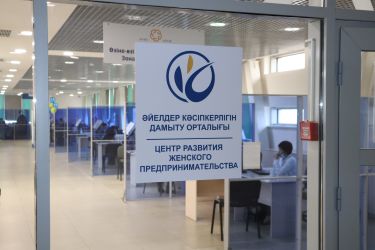Business in Kazakhstan
Running a Business: Where to Start?
 Starting a business from scratch is quite possible. But where exactly should you start, and where can you get money to start?
Starting a business from scratch is quite possible. But where exactly should you start, and where can you get money to start?
Defining a niche
The first step is to choose the direction: goods or services. Today, not only finished products are in demand, but also personal knowledge, skills, talents and experience. It is important to focus on the own strengths.
For example:
- A teacher can open an educational center.
- Accountant – offer accounting and auditing services.
It is also worth studying the market:
- What are the needs of potential customers?
- Who are your competitors and what services do they offer?
- How can you stand out and offer something new?
If there is no coffee shop in your area, for example, you could invest in a coffee machine and offer barista services.
A business plan draft
Once the niche has been identified, a business plan should be drawn up. It is important to include:
- Start-up costs and possible funding sources.
- Step-by-step development strategy.
- Possible risks and ways to minimize them.
At the first stage, you can work from home to reduce costs. For example, a hobby (baking, embroidery, etc.) can be turned into a business without renting an office.
The key is to start with what you do best and gradually grow own business.
Виды предпринимательства
Before starting your own business, it is important to choose the appropriate entrepreneurial activity form. This depends on the area in which you plan to work: trade, education, accounting, etc.
Individual entrepreneur (IE)
One of the simplest and most popular business forms is IE (Individual Entrepreneur). In Kazakhstan, you can register an IE quickly and without visiting government agencies. It is enough to submit a notification of the start of activity through:
- Electronic government portal (eGov.kz).
- Mobile second-tier banks application.
- State information system e-license.kz.
Who can open an individual entrepreneur?
- Citizens of Kazakhstan and ethnic Kazakhs “Kandas”.
- Citizens of the EAEU countries (Russia, Tajikistan, Kyrgyzstan, Belarus, Armenia) who permanently reside in the Republic of Kazakhstan.
An individual entrepreneur can be personal (run by one person) or joint (managed by several people).
Limited Liability Partnership (LLP)
If you plan to do business with a partner and jointly invest money, knowledge and effort, an LLP (Limited Liability Partnership) is the best option.
The main differences between a limited liability company and an individual entrepreneur:
- Registration with the justice authorities is required via gov.kz using an electronic digital signature.
- Submission of reports to statistical authorities is mandatory.
- A charter is required – without it you cannot open a bank account or receive government services.
LLP can engage in:
- Provision of services.
- Production and processing of goods.
Some activities require a license, for example:
- Construction.
- Sale of alcoholic beverages.
Authorized capital of LLP
To register a LLP, you need an authorized capital - this is the amount contributed by the founders. It determines their share in the company and cannot be used for current expenses (rent, raw materials, utilities, etc.). Even in a crisis, the authorized capital must remain in the LLP's account. In the event of company liquidation, this money can be used to pay off debts.
The choice between an individual entrepreneur and a limited liability company depends on your goals, the scale of your business and your management preferences.
Режимы налогообложения для малого бизнеса
When registering a business, it is important to choose the appropriate tax regime. There are two main regimes in Kazakhstan:
- Generally established taxation procedure.
- Special tax regimes (STR).
Generally established tax regime
This regime is used by small businesses that calculate their income tax using the standard scheme.
- The tax rate is 10% of net profit (income minus expenses).
- Expenses that can be taken into account are the purchase of goods, rent, salaries, communications and other official expenses.
- Payment deadline: once a year (before March 31 of the following year).
- Additionally, it is mandatory to keep accounting records in the 1C program.
This mode is most often chosen by enterprises with a large turnover and the ability to document expenses.
Special tax regimes (STR)
To support small businesses, the Tax Code provides for simplified tax regimes. They are convenient because they allow for a reduction in the tax burden and simplified reporting.
Main STR types:
- Patent based.
- Using a special mobile application.
- A simplified declaration based.
- Using a fixed deduction.
Let's look at each of them in more detail.
- A patent based STR
- Suitable only for individual entrepreneurs who work without hired employees.
- Available for 32 activity types (e.g. tutoring, repair man services, photography, etc.).
- The tax rate is 1% of the estimated income (tax is paid in advance).
- STR using a special mobile application
- Suitable for individual entrepreneurs without hired employees.
- Income for the year must not exceed 3 528 MCI.
- Includes 33 activity types.
- The tax rate is 1% of actual income.
- A simplified declaration based STR
- For entrepreneurs with up to 30 employees.
- Income for the year must not exceed 24 038 MCI.
- The tax rate is 3% of total income (excluding expenses).
- Reporting is submitted every six months.
- It is most often used in the fields of trade, catering and services.
- STR using a fixed deduction
- Allows reducing the tax base at 30% of the annual income without supporting documents.
- A reduction of 200% of the payroll is also possible.
- Higher limits have been established for turnover (144 184 MCI) and the number of employees (up to 50 people).
- Suitable for wholesale and retail trade, construction and services.
- A cash register is a must!
Regardless of the selected tax regime, when paying in cash or by card, you must use a control cash register (CCR).
Cash register options:
- A regular cash register is a physical device.
- Mobile cash register – an application on a smartphone.
Important: The cash register must be registered before starting to work with clients!
Аутсорсинг: что это и как помогает бизнесу?
 How to Simplify Your Business with Outsourcing and Digital Tools
How to Simplify Your Business with Outsourcing and Digital Tools
For a successful business, it is important to have a deep understanding of all its processes. The ideal business model is when you do what you know best, what you have experience and talent in.
If you don’t have the opportunity to assemble a team yet, you can use mobile applications, online tools and external resources – this will help automate processes and focus on the main thing..
What is outsourcing and how does it help business?
Outsourcing is the transfer of some of the company's tasks to another company that specializes in providing such services. This is a convenient solution if you cannot maintain full-time employees.
You don’t rent an office or pay salaries – you simply pay for a specific result.
You can delegate sales, marketing, accounting, logistics, and even customer support.
This saves time and resources, allowing you to focus on production or business development.
Automation of processes through digital services
Today, there are many online tools that help you run your business without spending a lot of money.
- Chatbots in Telegram and WhatsApp – they can automatically respond to customer requests, place orders and provide advice. This reduces the number of employees and speeds up the service.
- CRM systems – help manage your customer base, sales and orders.
- Accounting and finance applications – automate payments, tax calculations and expense accounting.
Using outsourcing and digital tools is a smart way to run a business with minimum costs and maximum efficiency!
Начать бизнес можно на гранты от государства
Since 2022, training in the basics of entrepreneurship under the Bastau Business program has been conducted online on the Skills.enbek.kz platform of the Electronic Labor Exchange.
How to complete the training?
- Register on the Business.enbek.kz portal.
- Please complete the automatic check to ensure you meet the requirements.
- If the conditions are met, go to Skills.enbek.kz and start training.
Who can participate?
- Unemployed citizens.
- Employees who were fired.
- Persons working without registering as individual entrepreneurs.
- Unpaid family business members.
- Citizens who grow produce for sale, but whose income is below the subsistence level.
- Individual entrepreneurs with less than 3 years of experience.
The course lasts up to 14 days, is free and ends with an electronic certificate (valid for 3 years).
How to get a grant?
The state allocates grants (up to 400 MCI) to socially vulnerable categories of citizens:
- Recipients of targeted social assistance
- For large families
- For persons who have lost their breadwinner
- To the settlers and ethnic Kazakhs “kandas”
- For people with disabilities and their caregivers
To receive a grant, you need to:
- Complete training under the program "Bastau Business"
- Register as unemployed or individual entrepreneur (less than 3 years)
- Submit an application on the Business.enbek.kz portal
The grant is provided once and can be used to purchase equipment, rent premises, purchase animals, seeds and other resources to start a business.
How to apply?
All applications are submitted through the Business.enbek.kz portal.
The system automatically checks for compliance with the conditions.
The final decision is made by the district or city commission.
Government support is a good chance to start your own business!
Меры нефинансовой поддержки предпринимателей
The state actively supports the new and existing entrepreneurs. The National Entrepreneurs Chamber "Atameken" offers non-financial support measures, which are provided through Entrepreneurship Service Centers (ESCs) located in all major cities of Kazakhstan.
If an entrepreneur has a small team or no experience in running a business, he can contact the ESC and get free help, for example, on taxation and reporting issues. Three key tools are used for this:
- Service support
It is provided in 19 ESC centers and helps entrepreneurs with running a business. The services are available:
- Offline – in the ESC centers in regional and district centers, as well as in single-industry towns and small towns.
- Online – via the web portal of the non-financial support operator.
- Information support
It operates in 190 ESCs across the country and is available to anyone who wants to start or is already running a business. Within this area, entrepreneurs can receive free consultations on government support measures, taxes, business planning, and much more.
- Business connections
This tool is aimed at in-service training of entrepreneurs and establishing business contacts. It includes two stages:
- The first stage is business training in Kazakhstan, where entrepreneurs study modern methods of business management, marketing and learn to develop business plans under the guidance of domestic and foreign experts.
- The second stage is an internship abroad at enterprises of a similar profile and the establishment of business connections with foreign partners.
All these support measures help entrepreneurs develop their business, minimize risks and improve management. If you have a business idea or an existing enterprise, you can contact the nearest Entrepreneur Service Center (ESC) and receive qualified assistance free of charge.
Центры развития женского предпринимательства
 Since November 2021, there have 17 Women's Entrepreneurship Development Centers (WEDC) opened in all regions of Kazakhstan within the framework of the National Entrepreneurs Chamber of the Republic of Kazakhstan "Atameken". Their activities are financed by the Asian Development Bank within the framework of the Solidarity Fund for Kazakhstan in the fight against the COVID-19 pandemic and are implemented in partnership with the United Nations Development Program (UNDP).
Since November 2021, there have 17 Women's Entrepreneurship Development Centers (WEDC) opened in all regions of Kazakhstan within the framework of the National Entrepreneurs Chamber of the Republic of Kazakhstan "Atameken". Their activities are financed by the Asian Development Bank within the framework of the Solidarity Fund for Kazakhstan in the fight against the COVID-19 pandemic and are implemented in partnership with the United Nations Development Program (UNDP).
Who can access the centers' services?
The centers are aimed at two women categories:
- Women with entrepreneurial initiative – those who are just planning to start a business. They can get information about support measures, consultations and recommendations for start-up.
- Active women entrepreneurs – those already running businesses, especially in rural areas. They are provided with support to develop and scale their businesses.
What services do the centers provide?
 The WEDC provides non-financial support aimed at developing women's businesses and personal growth. There are 7 service types available:
The WEDC provides non-financial support aimed at developing women's businesses and personal growth. There are 7 service types available:
Training is specialized courses on business, social entrepreneurship, cooperation, crowd-funding.
- Mentoring – guidance from experienced entrepreneurs and experts.
- Business valuation – assistance in analysis and development of development strategy.
- Consultations – on business registration, taxes, finances, equipment selection.
- Networking – participation in women's communities to exchange experiences and find partners.
- Information – access to up-to-date information about opportunities and support measures.
- Support for rural entrepreneurs – adapted programs for business in the regions.
- Regular trainings and master classes
The centers host weekly training events aimed at developing business competencies and personal growth. SMM marketing courses have already been organized as follows:
- Social entrepreneurship
- Vegetable growing and creation of cooperatives
Women's entrepreneurship development centers help women take their first step in business, develop their projects and contribute to the country's economy. If you have an idea or an existing business, you can contact the nearest center and get support for free!
Проект «Одно село – один продукт» (ОСОП)
One Village – One Product” is a program to support entrepreneurs aimed at developing rural areas through the production and promotion of competitive products from local raw materials.
The project is being implemented by the National Entrepreneurs Chamber "Atameken" within the framework of "Entrepreneurial capacity development "Men kasipker" initiative commissioned by the Ministry of National Economy.
Project objective
- Identifying promising products created from local and indigenous resources.
- Improving production technologies.
- Promotion of rural products on domestic and foreign markets.
Who can participate?
- Small and medium business.
- Residents of villages who want to start their own production.
What are the product requirements?
- Made from local raw materials (use of additional materials, such as fittings, is permitted).
- It is produced with simple tools that do not require large investments.
- Reflects regional features of the locality.
- Does not contain hazardous or harmful substances.
- Does not apply to perishable goods (shelf life must be at least 5 days).
- Availability of equipment and work places is desirable.
- The raw material capacity (for example, seasonality) is taken into account.
- The possibility of exporting products is being considered.
- A history of the product's creation and its connection to the region is welcome.
How to take part in the project?
- Submit an application to the regional entrepreneurs chamber "Atameken".
- Present products at the OVOP exhibition (a working group arranges the selection).
- Pass the selection of the Brand Committee (up to 10 finalists per region).
What do project participants get?
- Support in participation in exhibitions and fairs.
- Assistance in developing logos and trademarks.
- Training and marketing support.
- Opportunity to receive a non-repayable grant of up to 5 million tenge.